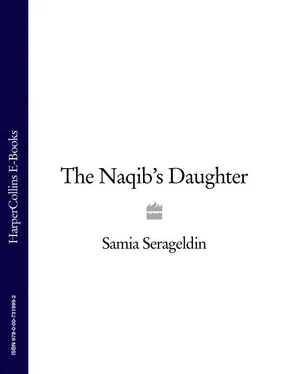Elfi turned back to the downstairs hall and slipped off his shirt. He splashed his face repeatedly in the large marble fountain with its brass jets, trying to clear his head. Looking at his reflection in the water he saw a face he had not seen in many years: a boy called Shamil.
Growing up in a stone hut on the side of a mountain in the Caucasus, the boy he had once been could no more have imagined this Ezbekiah mansion than he could have dreamed of the Sultan’s Top Kapi Saray in Istanbul. But tonight, Elfi was blindsided by a stab of homesickness for the sharp, clean mountain air of his native Tcherkessia. He longed for the taste of snow in summer, for the echoing silence, for the horizon that stretched on and on at a dizzying distance. Yet as a boy he had felt hemmed in by the vast emptiness of those mountains, and spent his time peering into the distance for a glimpse of the glittering Black Sea, dreaming of the ship that would one day carry him away.
Then, one summer day, as he watched his mother ladle yogurt into squares of cheesecloth that she hung in the sun to drip into soft balls of cheese, something in him turned. He went into the hut and threw his sheepskin-lined winter cloak over his shoulder, and stood for a moment at the door till his mother raised her worn face, tossed her long blonde plait over her shoulder, and put down her ladle. Then he turned away and jogged down the mountain, never looking back. He was fifteen years old.
The boy Shamil was buried in him now; there was only Muhammad Bey Elfi. Elfi thought of the first master who had bought him in Egypt: the Majnoon – the crazy one – had brought him home to a large, pleasant mansion with running fountains in the courtyard. That very evening he had invited a score of revellers to a lavish banquet. One of the servants had brought perfumed ointment and silk garments for Elfi to wear, and motioned for him to follow the sound of raucous laughter to the central hall where men lounged on cushions smoking long pipes and downing goblets of wine. His entrance had been greeted with a moment of admiring silence, then bawdy remarks in an Egyptian dialect he could not follow. The Majnoon had beckoned him and, removing a finely wrought gold chain from the several around his own neck, had tipped Elfi’s head forward and slipped the chain over his head, patting the links flat against his bare skin with a smile.
That night Elfi had carried his drunken master to his couch, then taken up vigil in front of the window open to the night air. At dawn he heard the muezzin’s chant, followed soon after by the desultory calls of the night watchmen across the city as they dragged open the gates of the neighbourhood alleys. From the stables across the lake there rose the mingled shouts and laughter of young voices, the sounds of horses neighing and rearing, of swords clashing: the young Mamlukes-in-training were engaging in their morning exercises in the horse ring across the way.
Elfi had walked over to the Majnoon’s couch and, coming behind him, had lifted his slack body into a half-sitting position, supporting him against his chest, an arm drawn across the man’s neck. His master had snorted awake, eyes wide with alarm, and Elfi had given him a moment or two to gather his sodden wits before whispering: ‘By law, either the master or the slave has the right to take the other to court to rescind the contract of sale within the first two weeks. I did not become a Mamluke to be the house-pet of a buffoon. Sell me now, or you will wake up one night to find your throat slit.’
The Majnoon had been so terrified he could not sell Elfi fast enough; he had given him to Murad Bey in exchange for a thousand ardabs of wheat – an unprecedented sum – and from that moment on he was known as Elfi, ‘he of the thousand’. Murad Bey had taken him into the greatest Mamluke house of them all, and had trained him well. He had been taught to think of his master as his father, and of Murad’s other young Mamlukes-in-training as his khushdash, his brothers. Recognizing Elfi’s merit, Murad had manumitted him in record time. Elfi had risen rapidly in the ranks from kashif to amir, commander. Today he owned a thousand Mamlukes of his own and commanded forty kashifs under him with a militia of thousands more. He owed much to Murad, and tonight he needed to remind himself of that debt.
Elfi ducked his head under the water and held his breath. As a boy he had trained himself to hold his breath in the cold, pure streams of his mountains, for as long as it took a hawk to circle seven times. From time to time he still practised this skill; he did not know why – only that it might come in handy, one day. He timed himself, counting.
The first house Elfi owned he had bought from the Majnoon, his former master. Then he had built the mansion at Old Cairo opposite the Nilometer, and one between the Gate of Victory and the Damurdash, in addition to the two houses he had bought in Ezbekiah. But this palace he had just completed was the culmination of his heart’s ambition. He had had it built from the ground up, razing the site, and sketching out the plans himself on a large sheet of paper. Day and night, kilns fired stones and churned out lime, and mills turned to crush gypsum, and large stones were quarried and transported by ship down the Nile to be sawn into slabs for floors, stairs and courtyards. Various kinds of woods, of marbles and columns, were imported, as well as the chandeliers and the indoor and outdoor fountains. The French had given him an enormous marble fountain with carved figures of fish that sent out jets of water, and that he had put in the garden, under the long vaulted roof he had built for shade and privacy.
He had installed latticework screens with inlaid coloured glass on the windows overlooking the lake, the gardens and the square, so that his women could enjoy the views in privacy. There were two bath halls with pools, one upstairs and one downstairs. He had the house built on different levels, with courtyards, doors and steps separating his private apartments from the apartments on the outer periphery of the courtyard where his Mamlukes would live.
He thought he had rid his nostrils forever of the sour smell of the goat cheese his mother made in that hut on the side of the mountain. But a hunger still gnawed in him, a hunger he could not satisfy with fine houses or sensuous women or hordes of servants or great power. He had grown up illiterate, but in his prime he discovered in himself a hunger for knowledge. Now he bought every book he could, even in languages he did not speak, and sought out the company of scholars and historians. His pride in the new mansion was the library, stocked with books on history and the sciences, particularly those that fascinated Elfi: astronomy, geometry and astrology. Were it not for the unassailable reputation for hard living he had earned in his youth, he would have lost face among his peers.
The first week after Elfi moved in, the house blazed every night with chandeliers and the courtyard and gardens sang with lanterns to greet the throngs of visitors who came to congratulate and envy. He owed it all to Murad. But on this day Elfi felt his loyalty tested as it had never been.
Elfi whipped his head out from under the jets of the fountain, taking in big breaths, and splashed the water under his arms and over his chest. He shook himself like a dog emerging from a pond. He could still hold his breath for as long as it took a hawk to circle seven times.
He had spent the night in council at the judge’s house, with the assembled Mamluke amirs and the civilian notables. Old Ibrahim Bey, the senior Mamluke and Prince of the Pilgrimage; Murad, Master of Cairo; Elfi, Tambourji, Bardissi, and the two other Beys who governed the main provinces of Egypt – the seven of them were the ruling Mamlukes. The senior kashifs immediately under their command were also present, along with Papas Oglu, the Greek captain of Murad’s river flotilla. The leading scholars and clerics of the Azhar University, headed by the judge, represented the notables. The heads of the guilds and the chief merchants rounded out the council and represented the commercial interests of the city.
Читать дальше












